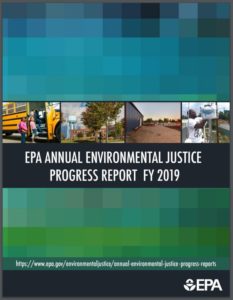Full Title: Fiscal Year 2019 Environmental Justice Progress Report
Author(s): U.S. Environmental Protection Agency (EPA)
Publisher(s): U.S. Environmental Protection Agency (EPA)
Publication Date: November 20, 2019
Full Text: Download Resource
Description (excerpt):
The FY 2019 Report describes how the Agency is working to meet the needs of vulnerable communities to address disproportionate environmental impacts, health disparities and economic distress, including the following examples:
Selected 50 new small EJ grants recipients in FY 2019 to receive $1.5 million in grant funding, with half of the grants going to communities located in or impacting Opportunity Zones.
Awarded $64.6 million to 149 communities with Brownfields grants, which will provide funding to assess, clean up and redevelop underutilized properties. 108 of the communities identified sites or targeted areas within Opportunity Zones. Awarded $46.19 million to support state and tribal response programs and continued to encourage the prioritization of sites in communities with the greatest need, including communities with EJ concerns.
Awarded approximately $50 million in funding for Diesel Emission Reduction Act projects with priority given to projects that engage and benefit local communities and applicants that demonstrated their ability to promote and continue efforts to reduce emissions after the project has ended in communities or populations that have faced or are facing EJ concerns. Awarded $29.4 million in targeted airshed grants that will reduce environmental and public health impacts in several communities throughout the U.S.
Provided technical assistance to communities affected by Superfund sites so that they could meaningfully contribute to the cleanup process, including 43 communities that received Technical Assistance Grants (TAGs) and 37 communities that received support through the Technical Assistance Services for Communities (TASC) Program.
Collaborated with state partners to develop online trainings on approaches to integrate EJ in state policies and programs, reaching over 4,000 people representing government agencies in all fifty states, Puerto Rico, Guam and the District of Columbia.
Selected 2020-2023 National Compliance Initiatives that prioritize impacts on vulnerable communities and will consider EJ issues throughout this work. Performed 868 EJ screenings in enforcement work, which assures that EPA enforcement personnel working on a case are aware of the potential EJ concerns in a community.
Provided trainings and technical assistance to approximately 40 states agencies and organizations, as well as local agencies and tribes, across all ten EPA Regions, on how to proactively address their civil rights obligations.
Trained and/or engaged with approximately 12,350 community residents, conducted approximately 300 workshops and community forum activities that addressed local environmental and public health issues, and developed approximately 50 new partnerships between EJ grantees and local stakeholders. This resulted in forty-four underserved communities that felt the meaningful impacts of EJ funding received over the last two years. Twenty-nine of the communities were in predominantly rural states, with over 90% of the grantee organizations receiving their first EJ grant this decade.
